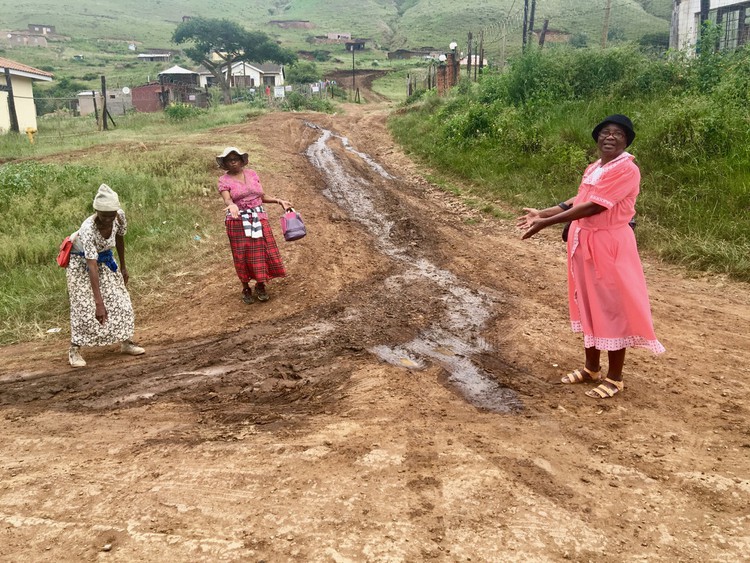
Residents of Shackville near Pietermaritzburg show GroundUp the conditions in their settlement. Photo: Nompendulo Ngubane
7 February 2018
“We are tired of begging for development,” says 50-year-old Mirriam Dlomo, who has been living in Shackville, Pietermaritzburg for three decades.
Most people in Shackville live in mud houses. On their own initiative, residents have connected taps in their houses to the settlement’s one communal tap. The nearest clinic is five kilometres away in Snathing. The settlement has no proper roads and no streetlights. Taxis won’t venture on to the roads but drop residents at a bus stop on the main route a few kilometres away.
Dlomo says residents asked for the road to be fixed. A grader came but left the road in a worse condition, full of potholes.
Mondli Zondi says he was born in Shackville 38 years ago. “We tried forming a committee but residents lost interest. Look at our roads, they are a mess. The only thing we have access to is water.”
Dlomo says ward 11 councillor, Sipho Madonda (ANC), has not held community meetings and doesn’t communicate. She said they have not seen him since he was re-elected for a third term.
Resident Kholiwe Nsele says Madonda told residents that Shackville land is privately owned and therefore it cannot be developed. However, pit toilets were built for residents years ago.
“Even my toilet is better than the house that I’m living in,” says Dlomo.
“We only see him [Madonda] when he is campaigning … We were promised houses when they were campaigning,” she says.
“We don’t know who owns the land. I was born here and I have grandchildren who were born here,” says Nsele.
Madonda told GroundUp, “People don’t attend meetings and there is always an issue. That land is privately owned. Government services cannot resume. The municipality will have to buy the land first.” Madonda would not say who owned the land.
He was unclear about when he last conducted a community meeting in Shackville.
Msunduzi municipality spokesperson Thobeka Mafumbatha said most land in the Shackville area was privately owned. She said the municipality, in partnership with the Department of Rural Development and Land Reform and the provincial Human Settlements department, was in the process of acquiring land. Only once this process was complete could funds be applied for and housing plans be made.